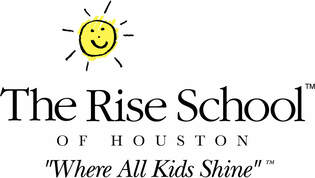THE 3LS PROGRAM
LANGUAGE, LETTERS AND LITERACY
The Language, Letters, and Literacy program (The 3Ls) helps infants, toddlers, and preschoolers with Down syndrome and other developmental disabilities develop language and early literacy skills. Rise classrooms progress in age from infants through preschoolers/prekindergarten students, and the 3Ls program is incorporated from the start. Each child’s individual needs and abilities are taken into consideration, allowing the program to meet each child right at their instructional level. With oversight from Rise’s Director of Education, teachers and therapists use developmentally appropriate activities for each age group to first teach communication and language skills, then letters, and finally, early literacy and math skills. Students work daily in structured activities that focus on oral motor development, receptive language development (the ability to understand what is being said), and expressive language development (the ability to convey thoughts, feelings, and ideas). Teachers incorporate the Learning Without Tears™ curriculum, introducing its methods and language in the infant rooms and then expanding and increasing its use as the children get older. In the young preschooler classrooms, a letter of the week is introduced and students learn its shape using tactile methods, explore the sound it makes, and associate words with it. In the older preschooler/prekindergarten rooms where letter identification and reading readiness become heavily emphasized, the letter of the week instruction is expanded as students start tracing and writing letters. Teachers also increase the use sight word identification, predictive text short stories, who/what/when/where picture cards, and flannel board stories for storytelling and retelling. The strength of the 3Ls program is that it reinforces and builds upon the skills the children have learned as they “graduate” to each classroom level.
Further, Rise’s Language/Assessment Specialist and a Texas Children’s Hospital Speech-Language Pathologist lead separate weekly group therapy sessions in each of Rise’s ten classrooms to promote oral motor development, enhance the skills required for receptive and expressive language, and build upon classroom instruction. Both the Language/Assessment Specialist and the Speech-Language Pathologist write parent newsletters two to four times yearly regarding communication, language, and feeding and swallowing skills.
The Language, Letters, and Literacy program (The 3Ls) helps infants, toddlers, and preschoolers with Down syndrome and other developmental disabilities develop language and early literacy skills. Rise classrooms progress in age from infants through preschoolers/prekindergarten students, and the 3Ls program is incorporated from the start. Each child’s individual needs and abilities are taken into consideration, allowing the program to meet each child right at their instructional level. With oversight from Rise’s Director of Education, teachers and therapists use developmentally appropriate activities for each age group to first teach communication and language skills, then letters, and finally, early literacy and math skills. Students work daily in structured activities that focus on oral motor development, receptive language development (the ability to understand what is being said), and expressive language development (the ability to convey thoughts, feelings, and ideas). Teachers incorporate the Learning Without Tears™ curriculum, introducing its methods and language in the infant rooms and then expanding and increasing its use as the children get older. In the young preschooler classrooms, a letter of the week is introduced and students learn its shape using tactile methods, explore the sound it makes, and associate words with it. In the older preschooler/prekindergarten rooms where letter identification and reading readiness become heavily emphasized, the letter of the week instruction is expanded as students start tracing and writing letters. Teachers also increase the use sight word identification, predictive text short stories, who/what/when/where picture cards, and flannel board stories for storytelling and retelling. The strength of the 3Ls program is that it reinforces and builds upon the skills the children have learned as they “graduate” to each classroom level.
Further, Rise’s Language/Assessment Specialist and a Texas Children’s Hospital Speech-Language Pathologist lead separate weekly group therapy sessions in each of Rise’s ten classrooms to promote oral motor development, enhance the skills required for receptive and expressive language, and build upon classroom instruction. Both the Language/Assessment Specialist and the Speech-Language Pathologist write parent newsletters two to four times yearly regarding communication, language, and feeding and swallowing skills.
|
|
The Rise School of Houston is a not-for-profit 501(c)(3) charitable organization.


